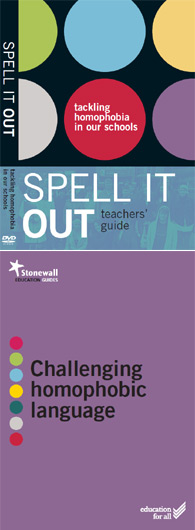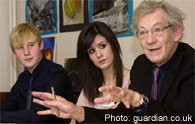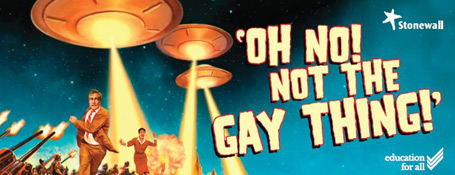The following is an excerpt of an article written by Stonewall Communications Officer Gary Nunn and published in the UK Guardian. Stonewall is a UK charity and lobby group that was co-founded in 1989 by actor Sir Ian McKellen and a small group of women and men who had been active in the struggle against Section 28 of the Local Government Act. On its website, it describes Section 28 while it was in force as being "an offensive piece of legislation designed to prevent the so-called 'promotion' of homosexuality in schools; as well as stigmatising gay people it also galvanised the gay community."

In 2005, Stonewall launched the Education for All campaign to help tackle homophobia and homophobic bullying in primary and secondary schools and works with a wide coalition of groups including local government and private organisations. Its offers workshops and training programmes for teachers and school staff to combat bullying in primary and secondary schools as well as resources for use in the classroom so that teachers can integrate combating homophobic bullying into the curriculum. A wide variety of resources such as reports and teaching resources to challenge homophobic language and support LGBT young people are available online. Stonewall's 6th annual Education for All Conference is slated to take place at the British Library on the July 1, 2011.
The group has since expanded its scope and programme to include and raise public awareness of civil partnership, parenting, workplace diversity, health issues and local projects to develop LGB communities.
"Do you know any gay people?" asks Sir Ian McKellen asks. Silence. Heads shake. "Well, you do now. I'm gay." It's my turn to speak up. "You know two now. I used to go to this school – and I'm gay," I offer. "You know three now," a sixth-former chips in. The other pupils don't look too surprised, and he seems admirably comfortable in his sexuality. Silence. Then: "Erm. Well. You know four now." Heads shoot around to see a uniformed boy, leaning close to McKellen. Mouths fall slightly open – including mine – but nobody speaks. Then McKellen says, in that mellifluous voice of his, "Well. How about that? It turns out we all know quite a few more gay people than we thought we did."
This is the third month of McKellen's nationwide "role model" tour of secondary schools on behalf of Stonewall, the gay equality charity that he co-founded, and which I work for, and the two of us have come to Hundred of Hoo comprehensive in Kent, which I left over a decade ago.
It has become a familiar scene for him. "My school visits are often rewarded by people coming out," he says. "And I don't just mean pupils – I've heard staff coming out to their heads on my visits, too."
McKellen obviously has a powerful effect on the schools he visits; how does this make him feel? "A bit overwhelmed – and privileged," he says.
Gandalf has worked his magic in 54 secondary schools over the last two years. His dream? An education system free of the homophobia that has plagued it for years – and a curriculum that fully includes lesbian, gay and bisexual people.
Hundred of Hoo has recently come out of special measures and is no stranger to underachievement. McKellen and Stonewall see visits to schools like this as crucial to ensure that not one ounce of potential is lost for today's gay pupils – especially for those who under-perform because their confidence has been battered by bullying.

Homophobia was rife when I was a pupil. "Freak", "queer" and "disgusting" were familiar words, aimed at anyone, like me, who was perceived to be gay. Consequently, nobody dared to come out. This created an un-virtuous circle; teachers could see no reason to address gay issues in lessons when there appeared to be no gay pupils. It wasn't until I left that I discovered three of my best school friends were also gay. We had been too scared even to admit it to each other.
The notorious "section 28" law, introduced in 1988 when Margaret Thatcher was prime minister, was to blame for much of this. This made it illegal to "promote" homosexuality in schools. So homophobia festered unchallenged for 15 years until its repeal in 2003. But the hangover remains. Recent YouGov research for Stonewall found that nine in 10 secondary school teachers say their pupils experience homophobic bullying, but nine in 10 have never received any training on how to tackle it. Ninety five per cent of teachers hear the phrases "you're so gay" or "that's so gay". Homophobia is so commonplace that "gay" has entered the school vernacular as a synonym for anything inadequate.












 列印版本
列印版本













讀者回應
Promoting equality on his Role Model Tour, he's doing what he can to make a positive difference in many lives.
Metaphorically speaking, when I look into the mirror, I wish I saw "Gandalf's" noble reflection.
請先登入再使用此功能。